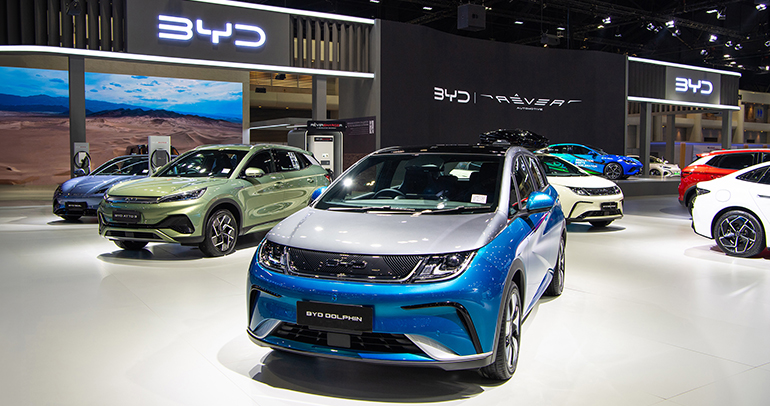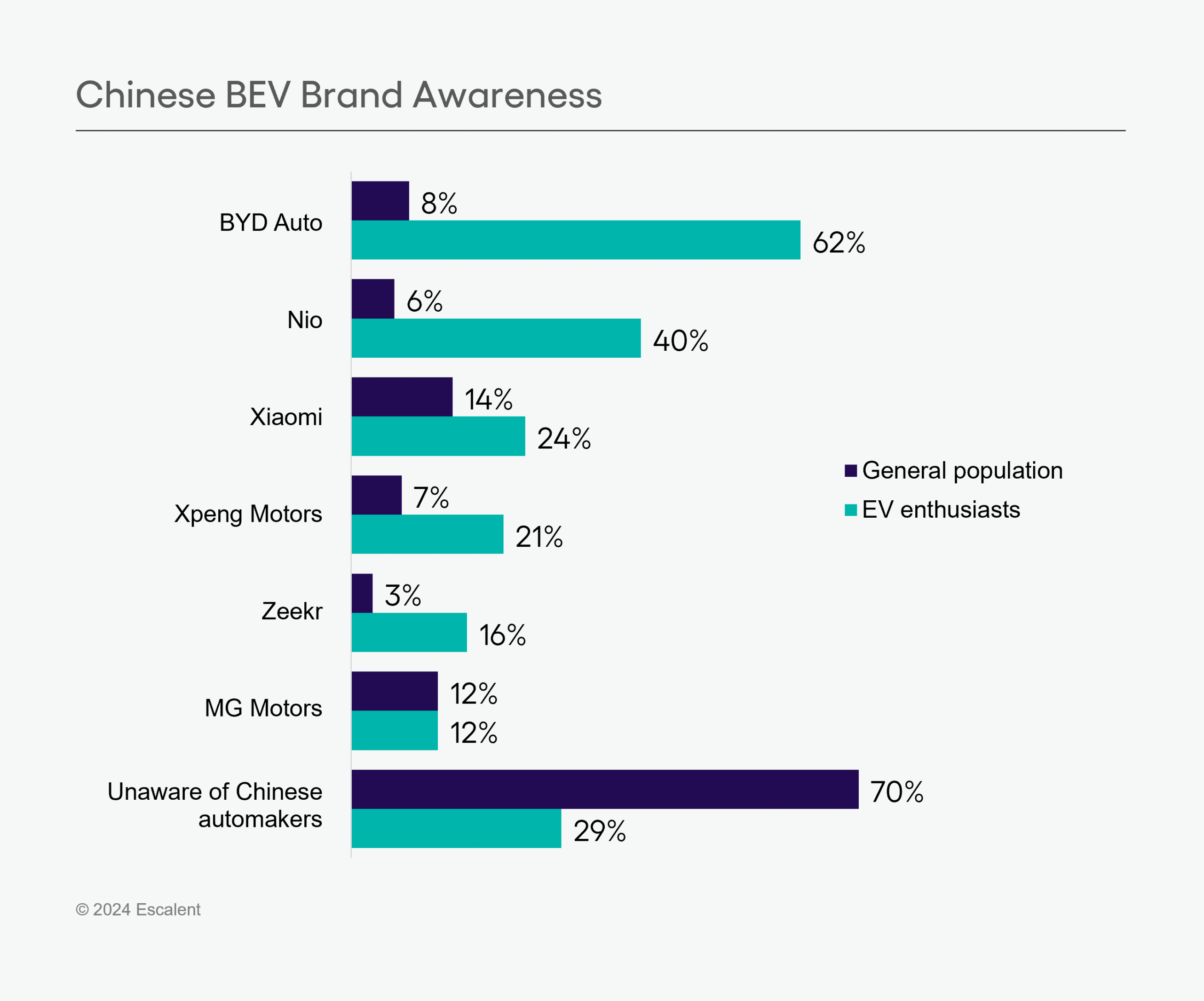
Chinese automakers have been steadily increasing their presence on the global stage, with a significant number already making strides in Europe. My colleague Mark Carpenter and I wrote about Chinese brands’ overwhelming presence in our takeaways from the 2023 IAA Mobility show in Germany. Chinese brands are also eyeing opportunities in North America. One notable player is BYD, the global leader in battery electric vehicle (BEV) sales. BYD has established electric bus and battery factories in California and recently announced plans to both build a passenger vehicle factory in Mexico and begin selling vehicles in Canada. Building their vehicles in Mexico is in reaction to the Biden administration’s 100% tariffs on Chinese-made vehicles, taking advantage of the United States-Mexico-Canada Agreement.
Despite these advancements, most (70%) of the US population remains unfamiliar with major Chinese automotive brands. This lack of recognition contributes to a general reluctance among consumers to purchase vehicles from Chinese automakers. Interestingly, even among BEV enthusiasts who are relatively familiar with Chinese brands such as BYD, Nio and Xiaomi, there is still a significant hesitancy to consider purchasing a Chinese vehicle if brand is taken out of the equation.

From Generic “Chinese Vehicle” Consideration to a Specific Vehicle
This reluctance to buy Chinese vehicles is largely based on a generic perception of these vehicles being manufactured in China, without specific brand or model details. However, when brand names are included in the consideration, there is a noticeable shift in consumer interest. According to our EVForward® study of the next generation of electric vehicle (EV) buyers, new-vehicle buyers show a relatively high degree of consideration for certain Chinese BEV brands. For example, Zeekr, Geely’s luxury BEV brand, garners a 71% consideration rate, while the more well-known BYD achieves a 55% consideration rate.
“If a Chinese BEV offers similar features and performance at a lower price, it would be highly attractive.”
– US-based, new-car shopper considering Chinese vehicles
One of the major factors driving this consideration is competitive pricing. For many consumers, the cost of BEVs remains a significant barrier to adoption. Chinese automakers, known for offering competitively priced vehicles, are well-positioned to attract cost-conscious buyers. Additionally, many potential buyers perceive Chinese vehicles to be more technologically advanced than those from other countries. This perception has been reinforced by recent innovations showcased at the Beijing Auto Show, where Chinese brands introduced a range of cutting-edge technologies and connected vehicle features.
Understanding Consumer Concerns Over the Quality, Reliability and Durability of Chinese Automotive Brands
Despite competitive pricing and technological leadership, Chinese automakers face several challenges in gaining broad acceptance in the US market. Quality, reliability and durability are critical factors for many consumers when choosing a vehicle. Buyers’ previous experience with Chinese durable goods being poorly made, along with a general lack of familiarity with the brands and their vehicles, leads to a lack of trust in the quality and reliability of Chinese-made vehicles.
“I’m concerned about the quality of the vehicles. Continental, Japanese, Korean and American cars have the pedigree and the history. Chinese car makers are relatively new, coming up over the past decade. I would like to know more about the cars before I’d consider them.”
– US-based, new-car shopper not considering Chinese vehicles
Moreover, this lack of information about Chinese vehicles further exacerbates consumer reluctance. Many potential buyers simultaneously prefer established, tried-and-true brands but are simply unfamiliar with Chinese brands that have less of a legacy than other automakers. Adding to these concerns, many buyers strongly prefer domestic cars and worry about lingering political tensions between China and the West.
The Path Forward: Understanding the Impact of Chinese Automakers on the Global Automotive Market
To help our clients navigate the evolving automotive landscape in the US and Europe, we are conducting a study of new-vehicle buyers in the US, UK, France, Germany, Spain and Italy to provide a detailed understanding of American and European consumer attitudes and behaviors toward Chinese automotive brands.
Key areas of focus of this Chinese Automotive Brand Impact study will include:
- Brand Awareness and Consideration: We will assess brand awareness, opinion and consideration for Chinese brands against currently in-market brands.
- Chinese Brand Owner Experience in Europe: To provide a holistic view of the ownership experience, we will include insights from current owners of Chinese-made vehicles in Europe.
- Consumers’ Emotional Reactions to Chinese Design: Using Escalent’s proprietary Evoke™ methodology that uses carefully curated images that have been scientifically linked to specific emotions, we will benchmark consumers’ emotional reactions to Chinese vehicle designs against segment best sellers.
- Pricing Expectations: We will analyze pricing expectations for Chinese brands and how these align with consumers’ willingness to pay.
- Appeal of Connected Features: We will evaluate the appeal of Chinese vehicles’ innovative connected features.
- Impact of Retail and Service Networks: We will examine how the presence and quality of retail and service networks influence consumer consideration.
- Geopolitical Decision Factors: We will explore the impact of geopolitical concerns, such as data privacy, on consumer decisions.
Chinese automakers are poised to play a significant role on the global stage. While they have challenges to overcome, particularly in terms of brand recognition and consumer trust, the competitive pricing and advanced technology offered by these brands present substantial opportunities for them to grow market share quickly.
Our Chinese Automotive Brand Impact study will provide our clients with valuable insights into how consumers are considering the adoption of Chinese car brands and how our clients can develop strategies to protect their market share.
If you’d like to learn more about our study or how our Automotive & Mobility experts can help you strategically navigate the influence of Chinese automotive brands within the US and Europe, send us a note using the form below.
Want to learn more? Let’s connect.
About EVForward®
The EVForward data cited come from a study conducted from January 16 to 24, 2024, among a US sample of 903 customers owning a model year 2019 or newer primary vehicle and intending to purchase a new vehicle within five years. These respondents are a subset of the EVForward database, a global sample of more than 50,000 new-vehicle buyers ages 18 to 80, weighted by age, gender, race and location to match the demographics of the new-vehicle buyer population and by vehicle segment to match current vehicle sales. The sample for this research comes from an opt-in online panel. As such, any reported margins of error or significance tests are estimated and rely on the same statistical assumptions as data collected from a random probability sample. Escalent will supply the exact wording of any survey question upon request.
About Escalent’s Automotive Consumer Panel
Data cited within this article also come from Escalent’s Automotive Consumer Panel, for which we interviewed a national sample of 1,002 consumers ages 18 and older from July 3 to July 12, 2024. Respondents were recruited from various opt-in online panels of US adults and interviewed online. Demographic quotas of age, gender, ethnicity and income were in place to represent the US adult population. As the sample for this research comes from an opt-in, online panel, any reported margins of error or significance tests are estimated and rely on the same statistical assumptions as data collected from a random probability sample. Escalent will supply the exact wording of any survey question upon request.
About Escalent’s MyDrivingPower™ Panel
Data cited within this article also come from a study we conducted from June 7 to June 17, 2024, among a national sample of 211 US consumers ages 18 and older from Escalent’s MyDrivingPower panel of EV enthusiasts. As the sample for this research comes from an opt-in, online panel, any reported margins of error or significance tests are estimated and rely on the same statistical assumptions as data collected from a random probability sample. Escalent will supply the exact wording of any survey question upon request.








